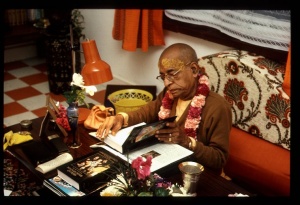SB 10.79.24: Difference between revisions
(Vanibot #0018 edit: make synonym terms in Sanskrit italic in SB - Vanisource) |
(Vanibot #0054 edit - transform synonyms into clickable links, which search similar occurrences) |
||
| Line 23: | Line 23: | ||
<div class="synonyms"> | <div class="synonyms"> | ||
''yudhiṣṭhiraḥ'' | ''[//vanipedia.org/wiki/Special:VaniSearch?s=yudhiṣṭhiraḥ&tab=syno_o&ds=1 yudhiṣṭhiraḥ]'' — King Yudhiṣṭhira; ''[//vanipedia.org/wiki/Special:VaniSearch?s=tu&tab=syno_o&ds=1 tu]'' — but; ''[//vanipedia.org/wiki/Special:VaniSearch?s=tam&tab=syno_o&ds=1 tam]'' — Him, Lord Balarāma; ''[//vanipedia.org/wiki/Special:VaniSearch?s=dṛṣṭvā&tab=syno_o&ds=1 dṛṣṭvā]'' — seeing; ''[//vanipedia.org/wiki/Special:VaniSearch?s=yamau&tab=syno_o&ds=1 yamau]'' — the twin brothers, Nakula and Sahadeva; ''[//vanipedia.org/wiki/Special:VaniSearch?s=kṛṣṇa&tab=syno_o&ds=1 kṛṣṇa]-[//vanipedia.org/wiki/Special:VaniSearch?s=arjunau&tab=syno_o&ds=1 arjunau]'' — Lord Kṛṣṇa and Arjuna; ''[//vanipedia.org/wiki/Special:VaniSearch?s=api&tab=syno_o&ds=1 api]'' — also; ''[//vanipedia.org/wiki/Special:VaniSearch?s=abhivādya&tab=syno_o&ds=1 abhivādya]'' — offering obeisances; ''[//vanipedia.org/wiki/Special:VaniSearch?s=abhavan&tab=syno_o&ds=1 abhavan]'' — they were; ''[//vanipedia.org/wiki/Special:VaniSearch?s=tuṣṇīm&tab=syno_o&ds=1 tuṣṇīm]'' — silent; ''[//vanipedia.org/wiki/Special:VaniSearch?s=kim&tab=syno_o&ds=1 kim]'' — what; ''[//vanipedia.org/wiki/Special:VaniSearch?s=vivakṣuḥ&tab=syno_o&ds=1 vivakṣuḥ]'' — intending to say; ''[//vanipedia.org/wiki/Special:VaniSearch?s=iha&tab=syno_o&ds=1 iha]'' — here; ''[//vanipedia.org/wiki/Special:VaniSearch?s=āgataḥ&tab=syno_o&ds=1 āgataḥ]'' — has come. | ||
</div> | </div> | ||
Latest revision as of 19:58, 17 February 2024

A.C. Bhaktivedanta Swami Prabhupada
Please note: The synonyms, translation and purport of this verse were composed by disciples of Śrīla Prabhupāda
TEXT 24
- yudhiṣṭhiras tu taṁ dṛṣṭvā
- yamau kṛṣṇārjunāv api
- abhivādyābhavaṁs tuṣṇīṁ
- kiṁ vivakṣur ihāgataḥ
SYNONYMS
yudhiṣṭhiraḥ — King Yudhiṣṭhira; tu — but; tam — Him, Lord Balarāma; dṛṣṭvā — seeing; yamau — the twin brothers, Nakula and Sahadeva; kṛṣṇa-arjunau — Lord Kṛṣṇa and Arjuna; api — also; abhivādya — offering obeisances; abhavan — they were; tuṣṇīm — silent; kim — what; vivakṣuḥ — intending to say; iha — here; āgataḥ — has come.
Translation and purport composed by disciples of Śrīla Prabhupāda
TRANSLATION
When Yudhiṣṭhira, Lord Kṛṣṇa, Arjuna and the twin brothers Nakula and Sahadeva saw Lord Balarāma, they offered Him respectful obeisances but said nothing, thinking "What has He come here to tell us?"
PURPORT
Śrīla Prabhupāda writes, "The reason they were silent was that Lord Balarāma was somewhat affectionate toward Duryodhana, who had learned from Balarāmajī the art of fighting with a club. Thus, when the fighting was going on, King Yudhiṣṭhira and the others thought that Balarāma might have come there to say something in favor of Duryodhana, and therefore they remained silent."